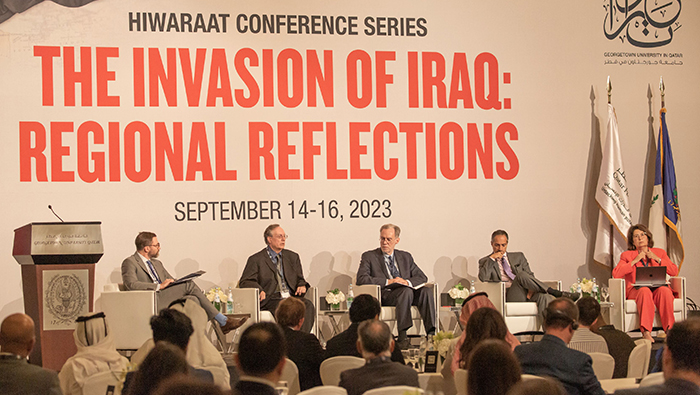
Doha: Bridging global and regional perspectives, Georgetown University in Qatar has concluded its timely conference to mark the 2003 invasion of Iraq with reflections on the prospects of shaping a better future for the country, its society, and its youth.
“The Invasion of Iraq: Regional Reflections” conference was convened by Dr. Safwan Masri, Dean of GU-Q, in collaboration with the Center for International and Regional Studies (CIRS) at GU-Q. Conceived as a platform for diverse voices and community engagement on shared global challenges, the conference encouraged collective and individual perspectives on lessons learned over the past two decades.
Current and former Iraqi ministers, officials, and government advisors, senior diplomats, journalists, authors, and academics from the region, joined international experts in sharing first-hand experience and knowledge, spanning historical retrospectives and analyses of Iraq’s progress and the complex challenges ahead.
Former president of Iraq, H.E. Dr. Barham Salih, highlighted the Iraqi people’s aspirations for stronger leadership, a strong state, and an accountable government: “We should acknowledge that we have very serious problems in the country – corruption, bad governance, sectarianism. I’m not diminishing those. But…Iraqis want to live in peace and enjoy the resources of the country. They genuinely want to integrate into the region,” he said, recalling “...young people came out on the street in 2019 chanting “Nurid Watan” (“We want a homeland”), and it was the most elegant statement about the dynamics of a society that wants to see a country reformed and that offers them opportunities.”
Discussions over the three days created a sense of shared responsibility to usher in positive changes that will offer the Iraqi people, especially the new generation, a better future.
Highlighting the significance of GU-Q leading such a dialogue, Dean Safwan said: “As we approach the university’s twentieth anniversary, Georgetown University in Qatar is reflecting on where we’ve been, where we are, and where we want to go. Our eyes are focused on the next 20 years. We are embarking on an ambitious strategy to become the preeminent global campus in the region. We are investing in and expanding our academic offerings, and strengthening and growing our faculty. We are creating and innovating, and engaging with our communities locally, regionally, and globally. This weekend’s event offers a preview of what is to come.”
Linking discussions on the upheavals and Iraq’s democratic transition within the past 20 years with the nation’s future, the conference deepened understanding of deeply interconnected national, regional, and global themes.
Speakers discussed the need for economic and infrastructure development, given the country’s growing population and high youth unemployment. The role of youth activism, civil society, social mobilisation, and the media, led into debates on inclusive governance solutions, climate change, and natural resource management, as well as durable solutions to land degradation and water scarcity.
On the regional front, in-depth panels delved into Iraq’s evolving relations with its immediate neighbors, the Arab Spring, and commonalities in the economic and governance challenges facing countries across the Middle East.
Beyond regional issues, the transnational challenges posed by the emergence of Da’esh, and the emerging global order, garnered attention. The conference explored the nature of Iraq’s future relationship with the US, how the invasion reshaped global diplomatic relations, and its profound impact on democracy in the US, including the ability of the US to exert moral authority.
GU-Q brought to the fore its strong academic leadership, and the university’s strong connections in the region attracted eminent experts and partners from within Georgetown’s wider network. Faculty members spoke on critical topics, while GU-Q students presented their research on youth and activism in Iraq.
“In keeping with the intent of the Hiwaraat, the conference has brought together a variety of perspectives, and not always complementary views on difficult and challenging topics. We have heard from scholars and practitioners and had lots of forthright engagement from the audience. These conversations are not always easy, but they are necessary. Under Hiwaraat we hope to continue providing the space for these sorts of discussions on important regional and global affairs,” said Zahra Babar, Associate Director for Research at CIRS.
The next conference in GU-Q’s Hiwaraat Conference Series will be “Global Histories and Practices of Islamophobia,” held from September 30 to October 1, exploring the global, historical, theological, and political dimensions that shape the practices of Islamophobia.
please visit: https://hiwaraat.qatar.georgetown.edu.